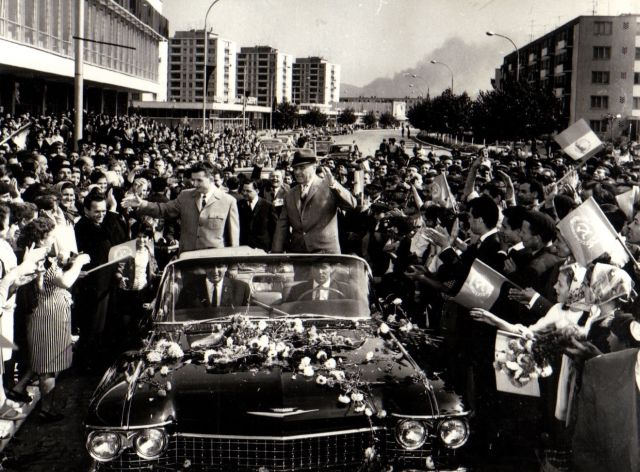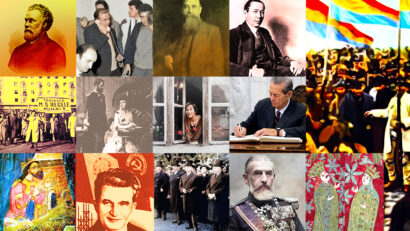Death and Succession in the CPR
Some communists eliminated their fellow party members in order to grab power within the ranks

Steliu Lambru, 09.05.2023, 21:28
Power has always been a temptation, and people have resorted a their whole arsenal of means in order to obtain it. History tells us about wars for power, assassination, bribery, forgery of documents and genealogies, manipulation, and overthrowing of the popular vote. In the process of taking power under the communist regime, the main actors used everything that humanity had invented that far. Set up on May 8, 1921, the Communist Party of Romania, the CPR, was promptly declared illegal. It followed the tradition of other communist parties in choosing their leaders. When Soviet troops gave them the power in March 1945, some communists eliminated their fellow party members in order to grab power within the ranks. Others were removed on orders from Moscow, which was controlling communist parties through the Komintern. Three of the seven CPR leaders before 1945, Elek Köblőș, Vitalyi Kholostenko și Alexander Shtefansky, were killed during the grand Stalin purges of the 1930’s. Another notorious case was that of CPR president Stefan Foris, killed with a crowbar to the head in 1946 upon orders from his rival, Gheorghe Gheorghiu-Dej.
After 1945, for Romanian communists at least, death became the only possibility for ascending to power within the party, while the position holder had the possibility of naming a successor. In 1965, Gheorghe Gheorghiu-Dej, Romania’s Stalin, passed away, and the appointment was contested between Nicolae Ceausescu, his eventual successor, and Gheorghe Apostol, who at the time was in fact the favorite. Janos Fazekas, was a former communist dignitary, and, in a 1997 interview with Radio Romania’s Center for Oral History, he spoke about the impact that Dej’s demise had:
“We felt it like a national tragedy, a tragedy for the party, the whole party. I, personally, had had very good relations with Gheorghe Gheorghiu-Dej, even though I criticized him often, but he didn’t kick me out, he had an affinity for young cadre. When he died, Lica, his daughter, with whom I was on good terms, helped me get to their house. He died at home, not the hospital, in his bed, and in attendance were all the members of the Political Bureau and the secondary members. Ceausescu had ruled that I wasn’t allowed in, because I was merely the minister in charge of the food industry, I was not a member of the Central Committee. There was a list, but I was on good terms with Lica, who helped me get in and attend the wake for Dej.
Dej’s death and succession for the CPR’s leadership became a big problem for those still standing. As the younger man, Ceausescu took his destiny into his own hands. Here is Janos Fazekas:
“At the side of Dej’s deathbed, Ceausescu takes the floor and takes an oath that he would fight for party unity, for the construction of socialism, would fight for increasing the people’s standard of living, culture, and civilization. Meaning that he himself, by doing that, was already telling us what he wanted to be. I was right there. Ceausescu knew that we didn’t want him, meaning that he knew Maurer, Apostol, Fazekas, we all were in favor of comrade Apostol’s candidacy. Initially, Dej had proposed Maurer for first secretary, and Maurer did not accept, he said that the first secretary had to be a Romanian, a citizen of Romanian nationality. He said that his mother was French, and his father German. And then Dej proposed Gheorghe Apostol, and Maurer said that Apostol was great.
As he was in a weaker position for succession, Ceausescu finally managed to turn the opinion of the others in his favor, as Janos Fazekas told us:
“After Dej’s funeral, Maurer and Bodnaras summoned the Political Bureau, which in turn could call for a plenary session of the Central Committee. Maurer arrived, we were already in the plenary room, and he called on the members of the Political Bureau to decide on electing Gheorghe Apostol. That is when Ceausescu jumped out of his chair, and started yelling that he didn’t agree it should be Apostol, even though before the funeral he had agreed. Comrade Maurer lost his patience, became furious at these lies perpetrated by Ceausescu, and told him he just wanted to be first secretary himself. ‘Then you be first secretary’, said Maurer. Of course, a politician doesn’t need much to lose his temper. He shouldn’t have lost his temper at Ceausescu’s trick, but for this there should have been a democratic tradition within the party. And, unfortunately, there was no such thing, not in our party, not in others either.
With Dej’s demise, an apparent liberal, with new and ambitious projects, namely Ceausescu, became the uncontested leader of Romania, the last leader of Socialist Romania. Unfortunately for him, and fortunately for Romanians, his death, as a means of accessing political power, was the last in a long chain, bringing his criminal regime to an end.





























